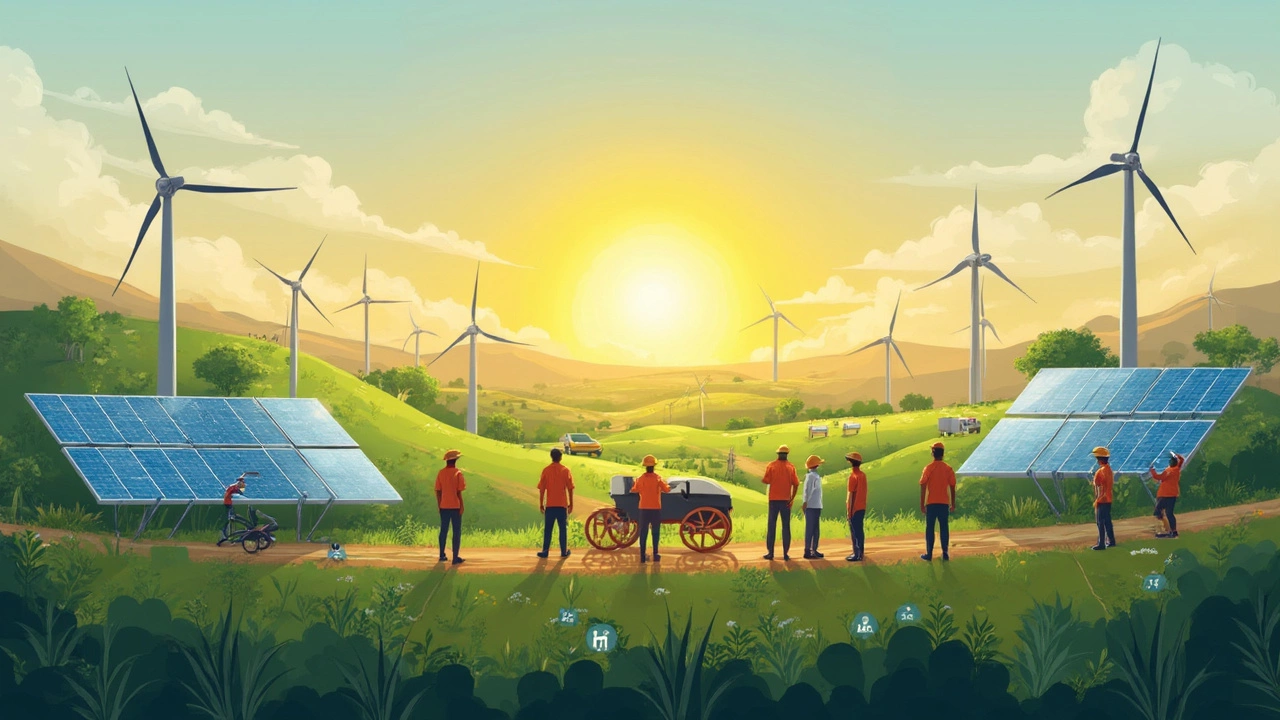Would you believe that, just a few years ago, electric cars were a rare sight, and barely anyone talked about AI at dinner tables? Now, things have completely flipped. People can’t stop wondering which industries are growing the fastest, who’s cashing in big, and where you should look if you want excitement, innovation, or a fresh career leap. Right now, we’re living in a wild transition zone, where headlines keep pinging with new breakthroughs and big bets. If you’re chasing the buzz or just want to know where the action is, let’s peel back the curtain and check out which sectors are making the loudest noise in 2025.
AI Is Leading the Charge: What’s Fueling the AI Industry Boom?
Ask any boardroom or college class in 2025: artificial intelligence is the rockstar here. From smart assistants in our pockets to super-intelligent software pushing startups into the stratosphere, AI is everywhere. It’s not hype—it’s big business, and the revenue numbers back that up. According to the International Data Corporation, global AI spending passed $500 billion last year. That’s a mind-blowing jump compared to a decade ago when it was still mostly science fiction talk. And it’s not slowing down—tech giants, banks, logistics firms, and even farmers are pouring money into smarter automation.
Why is AI so hot? Well, it’s simple: businesses save time and money, and regular folks get things done faster and better. Take ChatGPT, which unleashed a wave of generative AI tools in 2023. By 2024, pretty much every serious business had at least one AI project in the works. The killer use cases just keep piling up—recommendation engines for streaming, fraud detection in banking, supply chain bots predicting shortages, and even custom drug designs in medicine. Smart money is flowing into AI startups, nudging them to solve real-world headaches. If you’re job-hunting, skills like AI engineering, data analysis, or prompt engineering make you instantly more desirable. Coursera reported a 200% spike in AI course enrollments in the last 18 months, showing people are hustling to keep up.
Is this just a trend? Not really. Let’s look at what’s different in 2025. AI is now able to learn from noisy, real-world data faster than ever—companies like OpenAI, DeepMind, and Anthropic are rolling out models with billions of parameters, trained in weeks instead of months. Costs keep dropping: training an advanced model in 2018 cost millions; now you can do it for a fraction thanks to clever hardware and new chip tech. Even small businesses with shoestring IT budgets can rent advanced AI tools by the hour from Microsoft Azure or Google Cloud. This openness means every sector, from finance to farming, is baking AI into their daily routine.
The pressure is on to pump out new apps and services. Want to start an AI-driven business? You don’t need ten PhDs—just a laptop and the guts to experiment. That’s why tech accelerators have seen a five-fold increase in AI-focused startups joining their programs since 2022. Even creative gigs are changing—writing, video editing, music production—all shaped by smart tools that can write, edit, remix, and recommend in seconds. Those who embrace it, win. Those who don’t? Well… those jobs are vanishing fast.
But don’t think it’s just cool robots and apps. Behind the scenes, companies are scooping up AI to handle boring paperwork, tricky scheduling, customer emails, and tracking expenses. Factories are running predictive maintenance, and supply chains are rerouted in real time with barely any human touch. Hospitals track patient trends, insurers sniff out scams, and universities predict which students are at risk of dropping out—all powered by invisible AI. There’s even an AI-powered toothbrush (yep, Oral-B’s iO Series!), tracking how you brush and telling you what teeth you missed. If you want proof that AI’s reach is limitless, just look under your own hood. Odds are, you’re using it more than you think.
| Year | Global AI Market Value (USD Billion) |
|---|---|
| 2020 | 156 |
| 2022 | 327 |
| 2024 | 500+ |
One quick tip if you want to carve out a place in the AI world: don’t just focus on coding. Creative thinking, ethical debate, and user experience are just as valuable. Where humans add empathy and creativity, AI becomes the ultimate sidekick rather than a heartless machine. That’s what will make your work future-proof.

Green Energy and Climate Tech: From Green Hype to Real Growth
Now, scroll through the news and count how often you see headlines about a new solar farm, wind farm, or wild startup growing mushrooms into packaging material. Climate change isn’t waiting for anyone, and neither are the industries racing to fix it. Renewable energy, especially, is booming faster than most people realize. In 2024, renewables generated nearly one-third of all the world’s electricity, according to the International Energy Agency. Even oil giants are quietly shifting money into solar, wind, hydrogen, and—get this—even next-gen nuclear plants. These aren’t just small pilot projects anymore. We’re talking about solar fields covering miles, industrial-scale battery sites, and whole cities swapping out gas pipelines for heat pumps.
Where’s the growth happening? In almost every major country, governments are throwing down cash in a massive way. The U.S. Inflation Reduction Act threw nearly $400 billion at clean tech, while the European Union’s Green Deal is not far behind. India’s solar power capacity more than tripled between 2021 and 2025, and China is building green energy capacity faster than anyone. That means job creation on a scale you probably haven’t seen in your lifetime, touching engineers, construction workers, accountants, logistics experts, and software developers. In fact, the International Renewable Energy Agency estimates over 15 million green jobs worldwide in 2025—double the number from five years ago.
But green energy isn’t just about megaprojects or government policy. Look at how local businesses, even small cities, are leading with battery-powered delivery vehicles, rooftop solar, and recycled construction materials. There are supermarkets using AI to slash food waste by predicting what won’t sell and adjusting orders in real time. Factories use bioplastics and closed-loop recycling to keep trash out of oceans. Every layer of the economy is feeling this pressure—and opportunity—to get cleaner. Follow the money, and you’ll see venture capital funds tossing cash at climate startups tackling everything from plastic-eating enzymes to carbon capture concrete. In 2024 alone, nearly $65 billion went into early-stage climate tech, setting a record.
And the tech, oh man, it’s wild. Think next-gen solar panels that work in the shade, advanced wind turbines with 3D-printed parts, batteries that last decades, and algae turning pollution into protein snacks. You want practical tips? If you’re eyeing a career or investment, check out these sectors: battery tech, energy storage, solar installation, grid software, carbon accounting, and smart agriculture. Those roles are popping up everywhere, and pay is climbing fast.
Here’s a real-world trick: check for companies or funds focused on ESG (Environmental, Social, Governance). They’re legally tied to showing green results, so they’re on a hiring spree. And for entrepreneurs, partnering with local governments or leveraging tax breaks (massive and easy to claim in 2025) can bring capital in the door before you even launch your first product.
| Year | Global Renewable Energy Market Value (USD Trillion) |
|---|---|
| 2020 | 0.9 |
| 2023 | 1.45 |
| 2025 (projected) | 2.2 |
Maybe the wildest shift is in consumer behavior. People now demand proof that brands are clean, and they vote with their wallets. Companies brag about recycled packaging, net-zero facilities, and low-carbon operations on prime time TV. If you want to grow your business or land a job with meaning, going green is not just smart—it’s necessary.

Healthcare Technology: The Silent Revolution Reshaping Lives
Let’s not skip what’s happening in healthcare, because it’s sneakily one of the hottest booming industries 2025. Tech is taking over the clinics! Startups and hospital giants are using smart gadgets, data, and AI to change what “going to the doctor” even means. Remember those long waits at clinics? In 2025, telemedicine is the norm. The American Medical Association showed virtual visits grew 18-fold since 2020. We’re not talking grainy video calls either—real-time imaging, remote patient monitoring, and wearable devices mean most checkups can happen from your living room.
But telemedicine is just the start. Diagnostic AI, personalized medicine (where your treatment adapts to your DNA), and robotic surgery are all pushing the envelope. Hospitals have AI doctors reading X-rays, smart watches alerting families to heart problems before symptoms hit, and apps helping people control chronic health conditions. Wearables are getting so good you sometimes forget you’re even wearing them—Fitbit and Apple Watch are now joined by smart clothes, rings, and even smart hearing aids that double as fitness trackers.
One of the most talked-about breakthroughs in 2025? Gene-editing treatments for rare diseases. After the CRISPR wave, new startups are making gene therapy affordable and fast. And patients benefit, too—no more weeks waiting for results, as instant home diagnostics deliver data directly to your phone. Want another stat? According to MarketsandMarkets, the health tech market is shooting past $660 billion this year, up from $280 billion back in 2019.
Don’t think hospitals are the only winners. Pharmacies, insurance agencies, therapists, and rehabilitation centers all have their hands on health-tech software. Maybe you’ve already used an online pharmacy that delivers in hours or a chatbot for mental health support. The COVID shock in 2020 forced the whole industry to overhaul itself, but no one is going back to their old ways. Now it’s about remote, personal, real-time care—and the players who jump in fast are scaling up. It’s the ultimate home field advantage. Even fitness is getting a tech glow-up: virtual coaching, body scanners, AI-based meal planning, and remote group classes—and people love the flexibility.
What’s next? Maybe hospitals won’t need most paperwork—blockchain and health data platforms are making things secure, shareable, and transparent. Expect medical tourism to rise, as people cross borders for high-quality, AI-driven care. If you want to ride this wave, check out jobs in bioinformatics, medical robotics, health data management, and digital therapy. And for founders, building easy-to-use health apps or remote diagnostics is a gold mine. It’s a race to make healthcare easier, faster, and more personalized—so 2025 might finally be the year you dread doctor visits a little less.
| Year | Global Health Tech Market Value (USD Billion) |
|---|---|
| 2019 | 280 |
| 2023 | 530 |
| 2025 (projected) | 660+ |
Tired of outdated hospitals? Try remote patient monitoring, virtual fitness, or even DNA-based personalized diets—these are now more than just trends; they’re the future happening right now. The biggest winners are open to new ways of care and willing to mix tech with real human kindness. If that’s you, you’re ahead of the game in health innovation’s biggest year yet.
